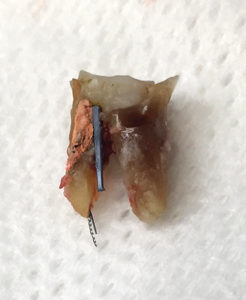Many of our patients are attracted to the allure of cheaper dental treatment abroad. Tooth #36 in the accompanying radiograph (Fig. 1) and photo (Fig. 2) is an example of such a case. Unfortunately in this case, almost every possible iatrogenic endodontic mishap was encountered. This treatment is substandard and if done in Canada the dentist would be worthy of reprimand.
Fig. 1

Fig. 2

The lady, to whom this tooth belonged to, returned to her ‘old country’ in order to avoid the high cost of Canadian dental care. She had a false sense of security as she spoke the lingua franca and has relatives living in the area who could recommend a local practitioner. However, none of this knowledge speaks to the regional standard of care and if it equates to those in Canada.
The Canadian dental market is competitive and the populace has a relatively high dental IQ. Our patients are informed consumers with easy access to care. One needs to be a skilled practitioner to do well here. This is the ‘carrot’ that helps maintain our high standards.
Other jurisdictions may not have analogous licensing and accreditation protocols for dental education, inspection of offices, radiation use, dental materials, sterilisation, ethics, continuing education, etc… Canadian dentists are held accountable for any misstep, be it patients leaving the practice, bad social media reviews, involvement of the dental association or college, and ultimately the courts. Public safety is the primary concern of our regulatory bodies and they are mandated to impose sanctions on any dentist who provides inadequate care. Insurance companies closely monitor our billing practices and impose strict penalties for infractions. These are the ‘sticks’ that ensure we are ethical and provide a high standard of care. Dental tourists cannot assume they will enjoy the same protection or high standards in other countries. In addition, our regulatory bodies and courts are powerless to address foreign mal treatment.
A recent Albertan study cited the significant and growing costs of rectifying complications from medical tourism. Many of the medical tourists are worse off for their adventures with life altering complications and permanent disabilities. These people then turn to the provincial health system for care. Consideration is being given to holding medical tourists liable for all costs related to complications associated with their foreign treatment. With this in mind, it is not unreasonable for private Canadian insurance companies to consider refusing coverage for procedures necessary to address complications dental tourists encounter. Regardless of the jurisdiction, it is always cheaper to have a procedure done well and once.
Dental tourism and the allure of supposed ‘cheaper’ treatment is not a risk-free panacea. There is little we can do to stop deal-seekers taking risks abroad and we cannot partake in an international race to the bottom. Fortunately, dental tourism is not all one way. A growing number of foreign nationals are coming to Canada because of our high standard of care; they recognise the value of the investment in their health. Our best defence is to maintain our high standards. OH
About the Author
 Dr. Joel Fransen is a certified specialist in endodontics. His office, Richmond Endodontic Centre, was established in 2010. In 2011 he became the first certified specialist in endodontics recognised in the Yukon Territory. He travels to Fort St. John and Williams Lake to provide endodontic care to those in more remote areas of British Columbia. He also works with a number of other endodontists in a satellite office in Langley, BC.
Dr. Joel Fransen is a certified specialist in endodontics. His office, Richmond Endodontic Centre, was established in 2010. In 2011 he became the first certified specialist in endodontics recognised in the Yukon Territory. He travels to Fort St. John and Williams Lake to provide endodontic care to those in more remote areas of British Columbia. He also works with a number of other endodontists in a satellite office in Langley, BC.
RELATED ARTICLE: Successful Endodontic Treatment of Internal Cervical Root Resorption












